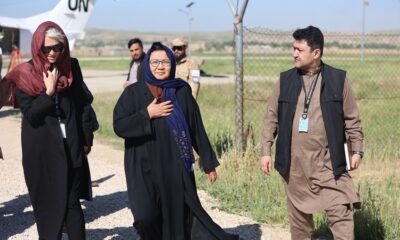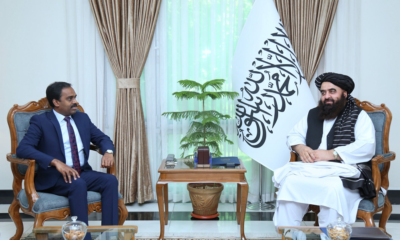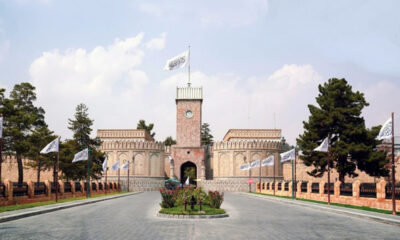Latest News
Afghanistan -Turkmenistan Tango

 Afghanistan is in the process of limiting Pakistan’s veto options on transportation of goods and looking at other routes being a landlocked country.
Afghanistan is in the process of limiting Pakistan’s veto options on transportation of goods and looking at other routes being a landlocked country.
Afghanistan’s President Ashraf Ghani visited Turkmenistan on July 3 upon invitation by President Gurbanguly Berdimuhamedov. Oguzkhan Palace complex in Turkmenistan hosted the high-level talks.
Various issues from security and counter-terrorism, economy and trade, energy, education and transportation infrastructure were discussed. Turkmenistan-Afghanistan-Pakistan-India (TAPI), Turkmenistan-Afghanistan-Pakistan (TAP)electricity project, and Turkmenistan-Uzbekistan-Tajikistan-Afghanistan-Pakistan (TUTAP) electricity transit project were discussed.
Transportation infrastructure cooperation is a way forward to make Afghanistan less dependent on Pakistan, who routinely closes checkpoints along the Durand line. President Ghani the next day told the visiting U.S. senate delegation that Afghanistan has diversified trade and transit links and is no longer dependent on Pakistan.
These are the main routes of transit to Afghanistan:
- Hairtan->Mazar e Sharif
- Mersin, Turkey-> Baku, Azerbaijan -> via ferry on Caspian Sea->Türkmenbaşy->Aqina->Sheberghan ->Mazar e Sharif
- Mersin, Turkey-> Baku, Azerbaijan -> via ferry on Caspian Sea->Türkmenbaşy-> Mary, Turkmenistan ->Torghundi->Herat-> Lashkargah ->Kandahar->Ghazni->Kabul
- Bandar Abbas ->Islam Qala->Herat-> Lashkargah ->Kandahar->Ghazni->Kabul
- Karachi->Quetta->Kandahar
- Karachi->Jalalabad->Kabul
Of these, the first route connects to China, the 2nd and 3rd to Europe, the 4th to Iran and the last two to Pakistan. As of now, the last two routes via Pakistan carry the most freight. When the Torkham gate was closed by Pakistan for an indefinite period following a skirmish between the respective armed forces, the other routes effectively neutralised any economic effect on Afghanistan.
Reconstruction and repairing of the Serhedabad (Azerbaijan)– Turghandi (Afghanistan) railroad and also expanding Aqina railroad were on the agenda of today’s meeting. The Asian transnational railway – Atamyrat-Ymamnzar-Akina was quoted as an example of the developing cooperation in the transport sphere between the two nations. In view of the transit and transportation potentials of the both countries, the presidents emphasized on Afghanistan-Turkmenistan-Azerbaijan-Georgia-Turkey trade and transit corridor and Tajikistan-Afghanistan-Turkmenistan railway. The trade and transit corridor is also known as the Lapis Lazuli corridor and the nations are due to sign an agreement for transporting goods to European markets. Turkmenistan itself serves as the fourth largest export market for Afghanistan.
Afghanistan has already diversified its trade and is no more heavily dependent on Pakistan. Trade volume between Pakistan and Afghanistan has declined from $3 billion a couple years ago to just $500 million in early 2017. That indicates a drop of more than an 80 percent in commerce between Afghanistan and Pakistan.
On the other hand, Afghan-Iran trade volume has increased 25 percent, from $1.5 billion to $2 billion, and now accounts for a quarter of Afghanistan’s total annual trade. The construction of railroad between Iran and Afghanistan and the Zaranj-Delaram Highway in Afghanistan are some factors behind the growth of Afghanistan – Iran trade. Trade with Europe and central Asia accounted for 24% of imports and exports stood at 11.6%.
Cooperation in oil & gas, chemical industry, textile, carpet weaving industry, farming and other sectors was discussed. An MoUs signed between the two nations is for cooperation In the carpet industry. It is worth noting that carpets are among the biggest exports from Afghanistan. Till now most carpets were produced to a pre-final stage and then exported to Pakistan or Iran. This was due to lack of resources like machinery for cutting and edging.
I spoke to the spokesperson of Afghan Chamber Of Commerce & Industries (ACCI) Siamuden Pasarly, who told me, “Till 2013-14, roughly around 80% of the carpets were exported to Pakistan, Iran & final processing done there. Now have our own factories. Industrial parks are under construction in PPP model. At present, 30% of the carpet go to Pakistan and Iran for final processing. We plan to absorb it and sell them under Afghan branding to the west.”
Implemented properly, the agreements at Turkmenistan would lead both to economic prosperity and reduced economic dependency on Pakistan for Afghanistan. It’s still a long way for land-locked Afghanistan to be no longer dependent on Pakistan but it’s a welcome start.
By Aveek Sen – Aveek Sen is an independent journalist working on cyber security and the geopolitics of India’s neighbourhood, focusing on Pakistan, Afghanistan, Iran and Bangladesh. He tweets at @aveeksen
—————–
* Responsibility for the information and views set out in this article lies entirely with the author, and it do not necessarily reflect the editorial policy of Ariana News.

Latest News
Qatar’s Prime Minister meets with Afghanistan’s foreign minister
According to Gulf Times, the two officials reviewed the latest developments in Afghanistan and discussed ways to support the Afghan people.
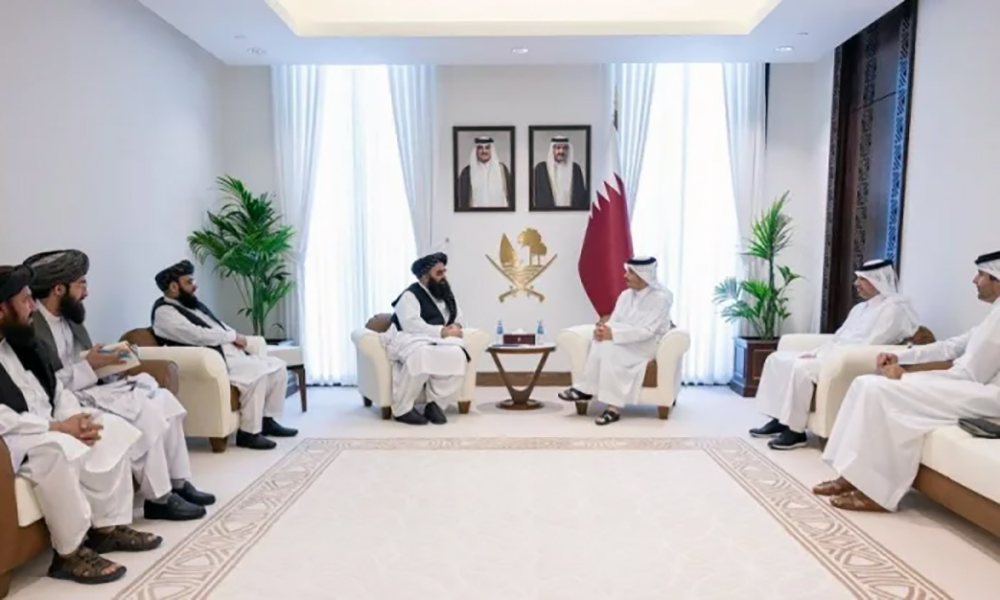
Qatar’s Prime Minister and Minister of Foreign Affairs Sheikh Mohammed bin Abdulrahman bin Jassim Al-Thani met with Afghanistan’s Acting Minister of Foreign Affairs Amir Khan Muttaqi who is currently visiting the country.
According to Gulf Times, the two officials reviewed the latest developments in Afghanistan and discussed ways to support the Afghan people.
Al-Thani emphasized the State of Qatar’s unwavering support for all segments of the Afghan people and its continued efforts to achieve security, stability, prosperity, and a dignified life in Afghanistan.
A source told Ariana News that Muttaqi arrived in Qatar on Sunday. No further details on his trip were given.
Latest News
WFP air services in Afghanistan may be suspended due to funding crisis
According to WFP, the organization urgently needs $10.5 million in funding to continue its relief flights in 2025.
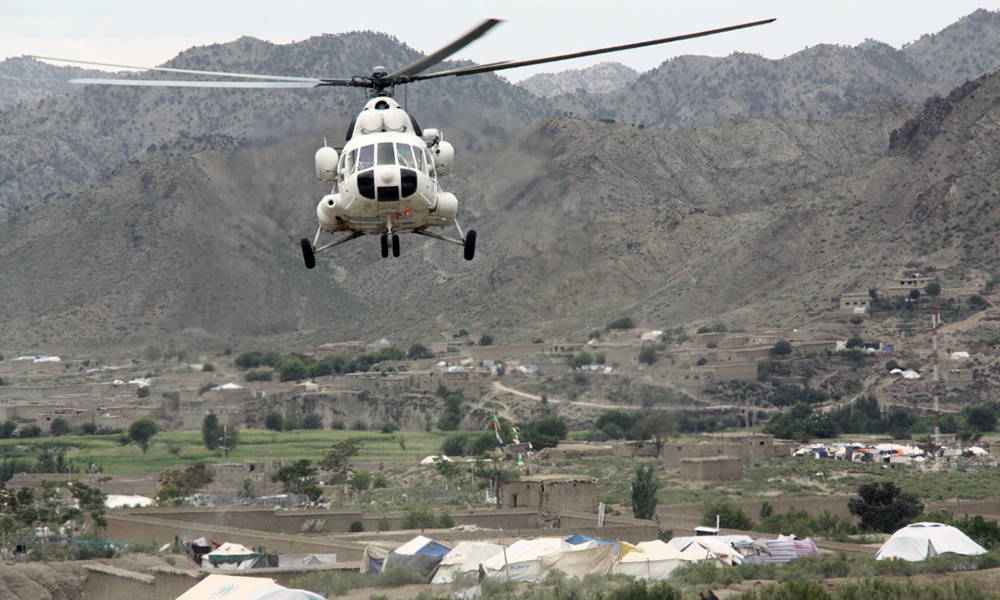
The UN’s World Food Program (WFP) in Afghanistan has announced the possible suspension of its air services in the country due to a severe shortage of funding.
WFP is one of the largest humanitarian organizations in Afghanistan and the air services have played a vital role in transporting humanitarian aid, especially to areas difficult to reach by land.
In a message posted on X, the WFP explained that in the past, when roads were blocked, air services were the only way to deliver aid to remote areas of Afghanistan. This aid included food, medicine, and other essential items that are essential for the survival of millions of people in need in Afghanistan.
According to WFP, the organization urgently needs $10.5 million in funding to continue its relief flights in 2025.
In addition, the WFP stated that humanitarian needs in Afghanistan continue to increase and millions of people across the country are dependent on humanitarian assistance.
WFP stated that if air services are stopped, it will become very difficult, if not impossible, to deliver vital aid to areas that are not accessible by road.
Latest News
Afghanistan and Iran swap prisoners at Milak border crossing
At the same time, two Iranians serving sentences in Afghan prisons were repatriated to Iran.
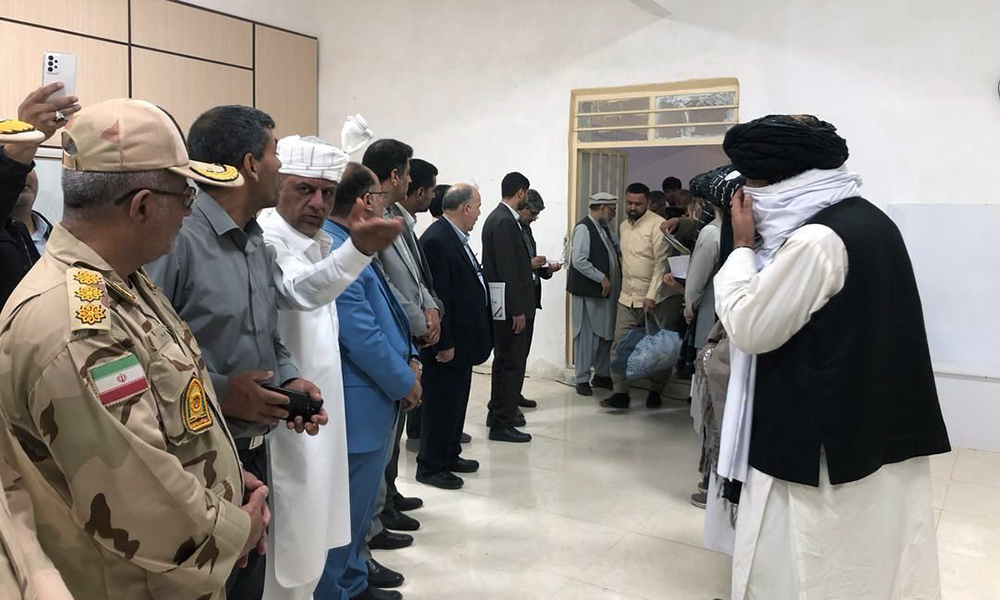
Afghanistan and Iran exchanged prisoners at the Milak border crossing in south-eastern Iran on Sunday, officials confirmed.
According to IRNA, almost 200 Afghan prisoners held in Iranian prisons in Tehran, Sistan and Baluchestan and Isfahan were handed over to Afghan authorities at the Milak border in Sistan and Baluchestan.
At the same time, two Iranians serving sentences in Afghan prisons were repatriated to Iran.
Iran’s Deputy Justice Minister for Human Rights and International Affairs, Askar Jalalian, said recently that more than 4,500 foreign nationals detained in Iran had been sent to their home countries.
-

 Sport5 days ago
Sport5 days agoSri Lanka A defeats Afghanistan A by 4 wickets in Abu Dhabi
-

 Latest News4 days ago
Latest News4 days agoAWCC activates new site in Nangarhar’s Kuz Kunar district
-

 Latest News4 days ago
Latest News4 days agoTarig Ali Bakheet and Japan’s Deputy Foreign Minister discuss Afghanistan’s situation
-

 Business4 days ago
Business4 days agoPakistan’s deputy PM discusses Trans-Afghan Railway Line project with Uzbek FM
-
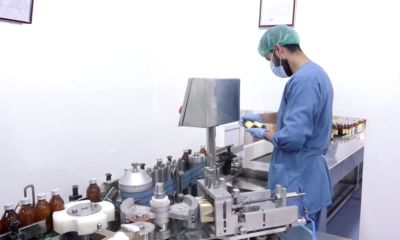
 Latest News3 days ago
Latest News3 days agoAfghanistan’s medicine output reaches 900 types: Pharma Union
-

 Latest News4 days ago
Latest News4 days agoAfghan delegation to participate in Iran’s international expo
-

 Latest News4 days ago
Latest News4 days agoWFP appeals for $25 million to help support Afghan returnees amid humanitarian crisis
-
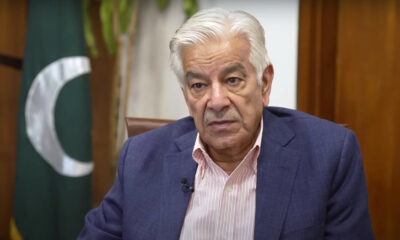
 Latest News3 days ago
Latest News3 days agoTerrorist attacks in Pakistan originate from Afghanistan: Khawaja Asif

